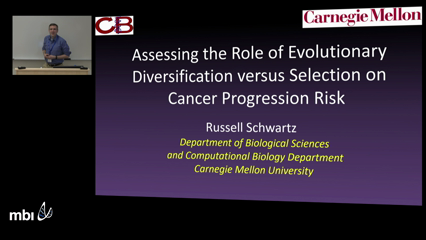
Russell Schwartz
It has long been recognized that cancer is a process of aberrant evolution, in which clonal diversification and selection result in progression from an initially healthy cell through precancerous and successively more aggressive cancerous states. Genomic studies have increasingly elucidated the finer details of these evolutionary processes and how they act in and vary between cancers, but there are still large gaps in our knowledge and our ability to apply it to translational directions. One key gap is our still-limited ability to predict risk of future cancer progression, e.g., which precancerous lesions are likely to progress to cancer, or which early cancers are likely to threaten the patient, to respond or recur following treatment, or to metastasize. Here, we explore the predictive power for progression outcomes of variations patient-to-patient in evolutionary diversification – i.e., risk arising from patient-specific variation in mechanisms of somatic hypermutability – as compared to the predictive power of selection – i.e., risk arising from patient-specific differences in the spectra of driver gene mutations. We estimate these factors using tumor genome sequence data, combining driver mutation calls with quantitative features derived from tumor phylogeny models and overall mutation burdens to assess in a machine learning analysis how these two classes of evolutionary factors collectively predict future cancer progression. Through application to a set of patient cohorts from the Cancer Genome Atlas (TCGA) and International Cancer Genome Consortium (ICGC), we show that measures of diversification and selection each contribute complementary and partially orthogonal predictive power relative to one another and to conventional clinical predictors of outcome. The work suggests the importance of better characterizing mechanisms of somatic variation in cancers and their role in cancer risk across diverse progression outcomes.
 Russell SchwartzIt has long been recognized that cancer is a process of aberrant evolution, in which clonal diversification and selection result in progression from an initially healthy cell through precancerous and successively more aggressive cancerous states. Genomic studies have increasingly elucidated the finer details of these evolutionary processes and how they act in and vary between cancers, but there are still large gaps in our knowledge and our ability to apply it to translational directions. One key gap is our still-limited ability to predict risk of future cancer progression, e.g., which precancerous lesions are likely to progress to cancer, or which early cancers are likely to threaten the patient, to respond or recur following treatment, or to metastasize. Here, we explore the predictive power for progression outcomes of variations patient-to-patient in evolutionary diversification – i.e., risk arising from patient-specific variation in mechanisms of somatic hypermutability – as compared to the predictive power of selection – i.e., risk arising from patient-specific differences in the spectra of driver gene mutations. We estimate these factors using tumor genome sequence data, combining driver mutation calls with quantitative features derived from tumor phylogeny models and overall mutation burdens to assess in a machine learning analysis how these two classes of evolutionary factors collectively predict future cancer progression. Through application to a set of patient cohorts from the Cancer Genome Atlas (TCGA) and International Cancer Genome Consortium (ICGC), we show that measures of diversification and selection each contribute complementary and partially orthogonal predictive power relative to one another and to conventional clinical predictors of outcome. The work suggests the importance of better characterizing mechanisms of somatic variation in cancers and their role in cancer risk across diverse progression outcomes.
Russell SchwartzIt has long been recognized that cancer is a process of aberrant evolution, in which clonal diversification and selection result in progression from an initially healthy cell through precancerous and successively more aggressive cancerous states. Genomic studies have increasingly elucidated the finer details of these evolutionary processes and how they act in and vary between cancers, but there are still large gaps in our knowledge and our ability to apply it to translational directions. One key gap is our still-limited ability to predict risk of future cancer progression, e.g., which precancerous lesions are likely to progress to cancer, or which early cancers are likely to threaten the patient, to respond or recur following treatment, or to metastasize. Here, we explore the predictive power for progression outcomes of variations patient-to-patient in evolutionary diversification – i.e., risk arising from patient-specific variation in mechanisms of somatic hypermutability – as compared to the predictive power of selection – i.e., risk arising from patient-specific differences in the spectra of driver gene mutations. We estimate these factors using tumor genome sequence data, combining driver mutation calls with quantitative features derived from tumor phylogeny models and overall mutation burdens to assess in a machine learning analysis how these two classes of evolutionary factors collectively predict future cancer progression. Through application to a set of patient cohorts from the Cancer Genome Atlas (TCGA) and International Cancer Genome Consortium (ICGC), we show that measures of diversification and selection each contribute complementary and partially orthogonal predictive power relative to one another and to conventional clinical predictors of outcome. The work suggests the importance of better characterizing mechanisms of somatic variation in cancers and their role in cancer risk across diverse progression outcomes.